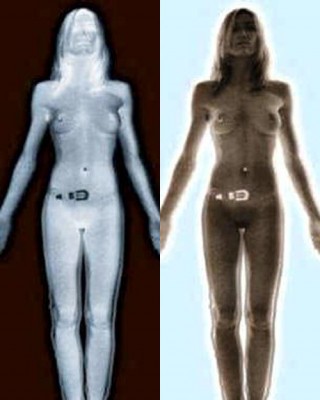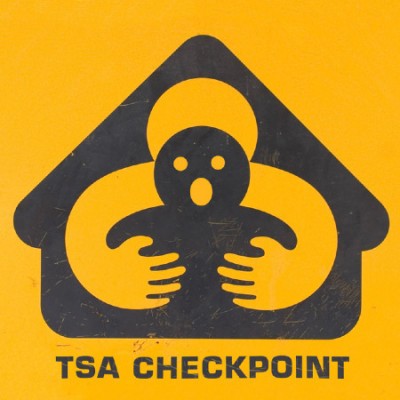Just before one of the most important American holidays (and peak travel season), the ferocious debate about the new full-body scanners and manual body searches at U.S. airports shows no sign of abating.
What I find most infuriating is the perplexing amount of disinformation and blatant propaganda spewed by the TSA and its supporters, to the degree where it becomes condescending and insulting to rational human beings.
First of all, every terrorism and explosives expert knows that even if these security procedures would be applied uniformly and everywhere (which they are not), there are still ways for suicide bombers to smuggle substantial amounts of explosives and a detonator on board of an aircraft. Without going into details here, I will just contend that it is rather easy for someone who is willing to die.
Second, the TSA’s assurances that nudie pictures of travelers will not be retained has little credibility in view of how things have played out in the last couple of years.
Third, the TSA’s contention that their personnel has no ability to save these images is ludicrous. Let’s say a tabloid offers $100,000 for a nude picture of an A-List celebrity (an amount not unheard of). Wouldn’t you agree that TSA agents might just be a tad tempted to whip out their camera-equipped cellphones when they see Scarlett Johannson standing in line? (As an experiment, I’ve tried to make cellphone shots of scanner images from my computer screen. They turned out pretty well).

On the left is what a screener would see. The image on the right has been "enhanced" with commonly available software.
So why do we have these new procedures? A good part of it is theater. The intent is simply to create the appearance of diligent care and security.
Then, there is the profit motive. The TSA needs funding; the (very costly) scanning machines need selling. How about a long wait, while trying to avoid missing a flight, followed by an invasive groping session by some more or less unpleasant individual?
What a great way to convince an impatient traveler that scanners are so much more convenient and worth the exorbitant cost. A near perfect push-pull marketing strategy! Besides, it’s all paid for by the already existing surcharges on our airline tickets anyway.
What concerns me are two issues. First, there is the inefficiency of the highly automated screening method. Just like automated fast food is junk food, these are junk screenings.
They constitute a veiled attempt to sweep the TSA’s shortcomings under the rug. Main problem: the TSA just does not have highly trained, college educated staff. Screening work is intensely repetitive and boring, so frequent rotation would be required. For that, the TSA lacks manpower and qualified personnel.
Even my own personal interactions have been rather discouraging.
I’ve found more than one TSA employee unable to articulate comprehensible English. One time, on a flight to San Francisco, these people failed to find a pocket knife I (unintentionally) had in my carry-on. Quite a few TSA employees had a rather unprofessional demeanor, and displayed a complete lack of manners, etiquette and tact. I have observed these people chewing gum while talking to passengers, holding private conversations with each other while on shift, bark and snap at old ladies who were not moving fast enough, and do a whole list of other things that would have gotten them fired from a position as a bank teller.
Departing from Great Britain was a very different experience by comparison. The British officers I encountered were polite and correct in their personal appearance and demeanor. They seemed articulate and well trained. And they asked questions: where was I going? What was in my bag? Did I pack it myself? Did I leave it out of my sight at any time? Of course, a terrorist would have lied. But the point is:
From the perspective of a terrorist organization, finding a way to smuggle a weapon on board of an an aircraft is less problematic than finding the right person to do it.
The ideal terrorist would have to be a person willing to die. He would have to have the right language and social skills. It would have to be someone who would not flinch at the last moment, chicken out, rat out the plan, nor give away secrets if captured — not even if tortured. The attacker can’t pull the trigger too early or too late. He must blend in and can’t arouse suspicion … there are endless possibilities to screw things up.
It’s hard to find such a person. And this is the terrorists’ weak point. Almost all people who knowingly go to their own death will at least show some kind of nervousness. Most will display some signs of fear. How many would be able to still say their lines convincingly, while looking into the eyes of a security professional trained and experienced in spotting lies and inconsistencies?
The 9-11 terrorists, the “Christmas-bomber”, the shoe bomber — all attracted attention. But the suspicious signs were not examined, were not acted upon. “Shoe-bomber” Richard Reid, for example, was so suspicious in Paris that he was not allowed to take his intended flight at first. What failed was the secondary examination by the National French Police. Their officers failed to detect the explosives in Reid’s shoes — a “delivery method” the police had never seen before and therefore not anticipated.
Most importantly, there is the constitutional question. The Bill of Rights states:
The right of the people to be secure in their persons, houses, papers, and effects, against unreasonable searches and seizures, shall not be violated, and no Warrants shall issue, but upon probable cause, supported by Oath or affirmation, and particularly describing the place to be searched, and the persons or things to be seized. (The Constitution of the United States of America, Fourth Amendment).
This is quite clear. For these airport searches not to violate the U.S. constitution, they must be “reasonable”. But what is “reasonable?
Right now, passengers on some airports are given the choice between going through scanning machines, which show the passenger nude. The passenger may retain the illusion of the being clothed. But in practice, the passenger has been disrobed. Nipple piercings, tampon strings — it all becomes visible. (Interestingly, both backscatter x-ray and millimeter wave scanners can be fooled and will not reliably show some types of explosives, if carried in certain ways).
Under the current regulations, each passenger who sets off the metal detector but refuses the full-body scan must undergo a mandatory, manual search. This often involves longer waits and consists of touching the passenger’s inner thighs, female breasts and male and female genitalia.
The passenger’s age, ethnic background, national origin and personal track record are not taken into consideration — which is absurd.
Sure, a terrorist could plant a bomb on a child or on a wheel-chair bound senior. But the complexity of such a plan is much greater, and thus the likelihood is much smaller.
Therefore, spreading all resources among all passengers evenly is simply a bow to “political correctness” and a fear of anti-discrimination lawsuits. But it makes no logical sense.
Countries such as Israel and Great Britain (the world’s most highly experienced veterans in the fight against terrorism) know better. In fact, every other country in the world profiles passengers to some degree.
The rest of the world tends favors less on technology and instead focuses more human attention on passengers who appear more suspicious. Privately, even U.S. terrorism experts I have heard from agreed that profiling makes perfect sense. (But only if speaking off the record, for fear of reprisals). As so often, the American approach is to simply throw more technology at the problem.
How about the manual searches? Here is a brief video taken by journalist colleague Steve Simon, whose 3-year old daughter Mandy was frisked like this:
The sloppy, harried search seen in the video is not only unprofessional. It is also ineffective.
But the real question is: Is it “reasonable” to search the 3-year old toddler of a well-known American journalist? Is it “reasonable” to manually touch the genitals of an 80-year old grandmother? (It is happening!)
If it is, what comes next? How about requiring every passenger to undergo a full-body x-ray of the internal organs before every flight? Still “reasonable”? How about a digital examination of someone’s body cavities, including vagina and rectum? Would this still be “reasonable”?
So, we have a sliding scale here. On it, there comes a point when every person would say, “stop, this is now becoming unreasonable”! Where is that point, for the majority?
The U.S. Constitution is the highest law of the land. It defines the role of the federal government and limits what it may do. One must remember that no body or agency of the federal government are ultimately entitled to interpret what “reasonable” means. This right belongs to the American people; it can be enforced through the judiciary.
So then, there is the argument that if the American people are too conservative, timid and limiting in their definition of a “reasonable” search, then the safety of the aviation system will suffer. American lives will be lost. This would certainly be the greater of two evils.
But there is another way to look at this.
We didn’t have a terrorism problem 50 or 60 years ago. Throughout America, passengers were routinely flying with guns in their carry-on luggage.
What has changed? And why?
Here is the inconvenient truth: the true cause and origin of the terrorist threat faced by America today is the result of U.S. foreign policy; it is the consequence of the American political, military and economic conduct around the globe since the end of World War II. Switzerland, having been neutral in world conflicts for 1,000 years, does not have this kind of problem. Neither do Austria, New Zealand, Canada or Japan.
So perhaps if, in the current world situation, Americans cannot enjoy safety without a gradual erosion of their constitutional freedoms, then the logical conclusion would be:
As far as U.S. foreign policy and global aspirations lead to problems which can only be counteracted by removing liberties guaranteed by the U.S. constitution, the federal government is not authorized to engage in such dangerous policies and global acitivites in the first place.
The logic is that anything that inevitably results in the erosion of guaranteed constitutional liberties is, by definition, unconstitutional.
One must not forget that first and foremost, the Framers of the Constitution wished America to be (and remain) a sovereign and independent nation. But one can see no indication that they intended to set the stage for a global American empire. On the contrary — it is safe to surmise that the very concept of a global American empire would have been quite abhorrent to most of the Founding Fathers.
And thus, the limitations set forth in the U.S. Constitution make perfect sense. Moreover, they are consistent with the Framers’ original vision of America.

